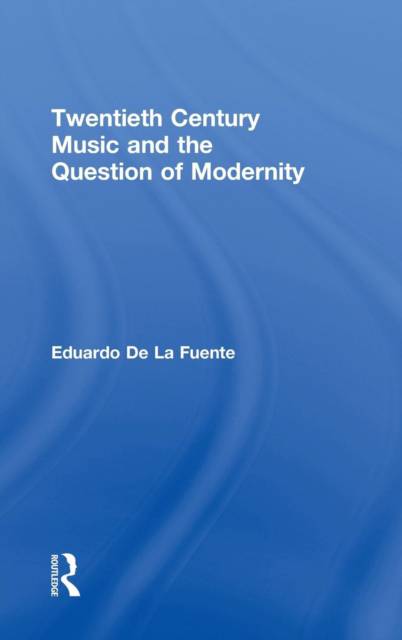
- Retrait gratuit dans votre magasin Club
- 7.000.000 titres dans notre catalogue
- Payer en toute sécurité
- Toujours un magasin près de chez vous
- Retrait gratuit dans votre magasin Club
- 7.000.0000 titres dans notre catalogue
- Payer en toute sécurité
- Toujours un magasin près de chez vous
Twentieth Century Music and the Question of Modernity
Eduardo de la FuenteDescription
In the first decade of the twentieth-century, many composers rejected the principles of tonality and regular beat. This signaled a dramatic challenge to the rationalist and linear conceptions of music that had existed in the West since the Renaissance. The 'break with tonality', Neo-Classicism, serialism, chance, minimalism and the return of the 'sacred' in music, are explored in this book for what they tell us about the condition of modernity. Modernity is here treated as a complex social and cultural formation, in which mythology, narrative, and the desire for 're-enchantment' have not completely disappeared. Through an analysis of Schoenberg, Stravinsky, Boulez and Cage, 'the author shows that the twentieth century composer often adopted an artistic personality akin to Max Weber's religious types of the prophet and priest, ascetic and mystic. Twentieth Century Music and the Question of Modernity advances a cultural sociology of modernity and shows that twentieth century musical culture often involved the adoption of 'apocalyptic' temporal narratives, a commitment to 'musical revolution', a desire to explore the limits of noise and sound, and, finally, redemption through the rediscovery of tonality. This book is essential reading for those interested in cultural sociology, sociological theory, music history, and modernity/modernism studies.
Spécifications
Parties prenantes
- Auteur(s) :
- Editeur:
Contenu
- Nombre de pages :
- 182
- Langue:
- Anglais
- Collection :
- Tome:
- n° 54
Caractéristiques
- EAN:
- 9780415962087
- Date de parution :
- 30-07-10
- Format:
- Livre relié
- Format numérique:
- Genaaid
- Dimensions :
- 152 mm x 229 mm
- Poids :
- 476 g

Les avis
Nous publions uniquement les avis qui respectent les conditions requises. Consultez nos conditions pour les avis.






